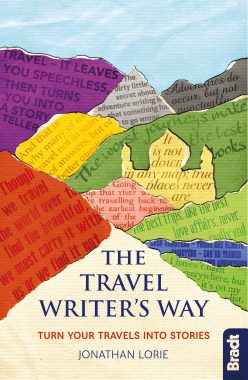FEBRUARY 2020 – from The Travel Writer’s Way

GET OUT OF THE WAY
Never stand between the reader and the story
A powerful mood in a piece of writing can act like a spell on your readers, lulling them into a dream world you’ve made, that surrounds and involves them in your story. You want to hold them there. You don’t want the magic to break.
A top tip for this is to keep your prose as transparent as possible. What do I mean by that? Essentially I’m suggesting you remove any elements that would make them aware of the writing itself. You want their attention on the mood signals, not the literary style.
So for starters be careful with your choice of vocabulary. You don’t want readers woken up by words or phrases that draw too much attention to themselves, perhaps by being out of keeping with the mood or difficult to understand. In a story set in an artisan coffee shop, you might well use ‘macchiato’ or ‘ristretto’ to describe a drink, but in someone’s kitchen you’d probably call a coffee ‘white’ or ‘black’. In either place, if the drink was weak you might not describe it as ‘skilligalee’, a word for coffee so obscure that it would send your readers googling for meanings.
Similarly, you can reduce your presence as the author by writing in a neutral and natural tone of voice. The way you tend to tell a story to a friend is the natural voice you have. This may change a little on the page and as you develop as a writer: you’ll find quick and effective ways of saying things on paper that you wouldn’t quite say out loud. But steering close to your natural speaking voice is a sensible rule for producing prose at ease with itself, which means we won’t notice it too much.
Thirdly, don’t draw attention to your style by using clichés. These leap out at readers as worn-out bits of phrase they’ve heard in other contexts. They don’t draw the reader in with fresh visions of the place or moment. They blur our view, instead of sharpening it. Travel writing is filled with clichés, especially in marketing websites that are thin on real material. Using them is always tempting – it’s quick and easy and suggests a given meaning. But they won’t do the job you want.
A variant on the use of clichés is the overuse of adjectives. These often appear like weeds in a garden, smothering the roses. They’re weak descriptive words, less powerful than the noun or verb, which show you ‘who’ is doing ‘what’. Compared to those, an adjective is just undergrowth. If that sounds far-fetched, try clearing all the adjectives from a paragraph of yours, and see if the flowers bloom.
These principles you can extend to any of your writing. They will leave the reader’s focus firmly on the story not the storyteller. The ideas behind them are brilliantly explored in a famous essay by George Orwell, ‘Politics and the English Language’, which is worth reading if you’re interested in this.
Not all writers go this way. In travel, Patrick Leigh Fermor leant towards a more jewelled style, which sometimes leaves you gasping for breath and gawping at the glitter. In fiction, Jorge Luis Borges developed a highly self-conscious prose style in which you are constantly aware of the act of narration. Such choices are there for you to make.
Extract from The Travel Writer’s Way, copyright Jonathan Lorie 2019.
